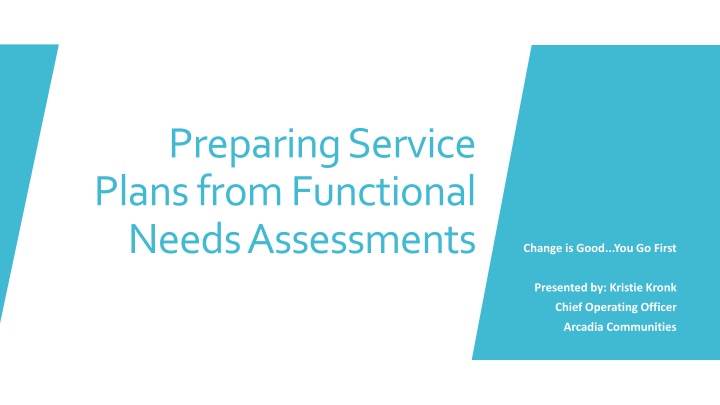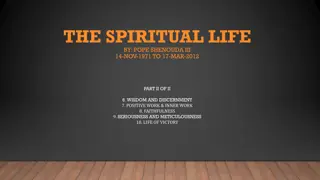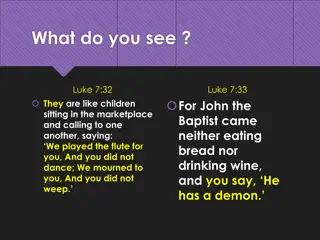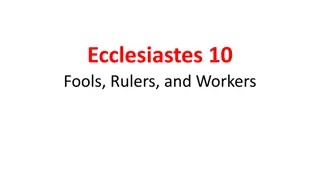Lessons on Wisdom and Folly
Exploring the teachings from Ecclesiastes 10:1-10, this section delves into the consequences of wisdom and folly in one's life. Through thought-provoking lessons on actions, influence, and recognition, the importance of making prudent decisions is underscored. Reflect on how a moment of indiscretion can tarnish a lifetime of respect, and consider the significance of wisdom in guiding one's path amidst social influences.
Download Presentation

Please find below an Image/Link to download the presentation.
The content on the website is provided AS IS for your information and personal use only. It may not be sold, licensed, or shared on other websites without obtaining consent from the author.If you encounter any issues during the download, it is possible that the publisher has removed the file from their server.
You are allowed to download the files provided on this website for personal or commercial use, subject to the condition that they are used lawfully. All files are the property of their respective owners.
The content on the website is provided AS IS for your information and personal use only. It may not be sold, licensed, or shared on other websites without obtaining consent from the author.
E N D
Presentation Transcript
Preparing Service Plans from Functional Needs Assessments Change is Good...You Go First Presented by: Kristie Kronk Chief Operating Officer Arcadia Communities
Service Plan means the written plan agreement between the resident and the licensee about services that will be provided to the resident SB 11 A Service Plan shall be designed to meet the IDENTIFIED needs and other topics the assisted living community determines to be necessary.
Service Plans: The How and The Why Service Plans provide the basis for services provided Service Plans should always be individualized and specific the resident needs
Key Reasons to Have a Service Plan The purpose of a service plan is to document the resident's needs, as well as the interventions planned to meet these needs. As part of the resident's health record, the service plan is used to establish continuity of care. A service plan ensures collaboration among nurses/staff, residents, families, and other healthcare providers.
Service Plan Fundamentals: In a simple but useful way, a service plan should include: The What: Care and Service The Why: Resident Needs and Competencies The How: Interventions/Assistance Provided The Who: Who is responsible The Frequency: How often The Evaluation: Review and update To be successful, a service plan needs effective communication and goal-oriented interventions. A service plan is your roadmap for effective care, and a collaboration tool that improves the resident s overall experience. Your RoadMap To be successful, a service plan needs effective communication and goal- oriented interventions. A service plan is your roadmap for effective care, and a collaboration tool that improves the resident s overall experience.
The 5 Steps That Lead to Well-developed Complete your Assessment/FNA Determine Service/Care Needed Service Plans Complete the Finally, Evaluate the Service Plan; Decide if the Plan Needs Modification. A community must keep evaluating their residents wellness or health status. Implementation/Interventions. The Interventions part focuses on helping the resident and care providers achieve expected outcomes Set specific, measurable, and achievable goals that guide care for the resident. Service plans guide how staff provide careto residents. Service plans document assessment needs, planned interventions, who is responsible, frequency and evaluation
Bathing Create a custom description specific to the resident This is time spent assisting the resident with bathing needs on scheduled shower days Does the resident require: Supervision requires staff to stand by for preparation and completion of bathing? Minimal assistance requires staff to stand by and provide assist until bathing is complete Moderate and extensive assistance requires staff to aide in the process until bathing is complete.
BATHING INDEPENDENT REQUIRES ASSISTANCE INCONTINENT MINIMAL ASSIST SUPERVISION TOTAL ASSIST FOR BATHING EXTENSIVE ASSIST MODERATE ASSIST NO LIMITED PARTICIPATION BY RESIDENT CUEING/REMINDERS/ MINIMAL HANDS ON ASSISTANCE ADDITIONAL MINUTES 45 MINUTES OR GREATER SCHEDULED TWICE WEEKLY (OR BASED ON SHOWER SCHEDULE) 30 MINUTES SCHEDULED TWICE WEEKLY (OR BASED ON SHOWER SCHEDULE) 30 MINUTES SCHEDULED TWICE WEEKLY (OR BASED ON SHOWER SCHEDULE) 30 MINUTES SCHEDULED TWICE WEEKLY (OR BASED ON SHOWER SCHEDULE)
BEHAVIOR SERVICE PLANS SHOULD INCLUDE SPECIFIC INTERVENTIONS THAT WORK OR DO NOT WORK FOR EACH RESIDENT Behaviors BEHAVIORS INCLUDE, BUT NOT LIMITED TO: ANXIETY/DEPRESSION SECLUSION ANGER/AGGRESSION/AGITATION WANDERING/EXIT-SEEKING RESISTANCE TO CARE HALLUCINATIONS/DELUSIONS COMBATIVE INAPPROPRIATE ELIMINATION Create a custom description specific to the resident
BEHAVIORS EXPERIENCES BEHAVIORS NO BEHAVIORS INCONTINENT FREQUENT BEHAVIORS EXTENSIVE BEHAVIORS OCCASIONAL BEHAVIORS (OCCURS SEVERAL TIMES PER WEEK OR DAILY) (OCCURS TWICE DAILY OR MORE) NOT ADDED TO SERVICE PLAN Behaviors include (not limited to): 5 MINUTES 10 MINUTES SCHEDULED EVERY SHIFT 15 MINUTES OR MORE SCHEDULED EVERY SHIFT SCHEDULED EVERY SHIFT Anxiety/depression Seclusion Anger/aggression/agitation Wandering/exit seeking Resistance to care Hallucinations/delusions Combative Inappropriate elimination Interventions include (but not limited to): Comfort/support Redirection Activity Engagement Re-approach 1:1
Why Is Communication Important in Assisted Living? For nurses and care staff,good communicationin healthcaremeans approaching every resident interaction with the intention to understand the resident's concerns, experiences, and opinions. This includes using verbal and nonverbal communication skills, along with active listening Having good communication skills is essential to collaborating on teams with your fellow staff members and colleagues from other disciplines. It s also important to resident-centered care. Staff who take the time to listen and understand the concerns of each of their residents are better prepared to address issues as they arise, resulting in better resident outcomes. On the other hand, poor communication, or lack of communication in healthcare, can lead to residents misunderstanding directions and failing to follow directions/interventions.
Question and Answer Preparing for Change























